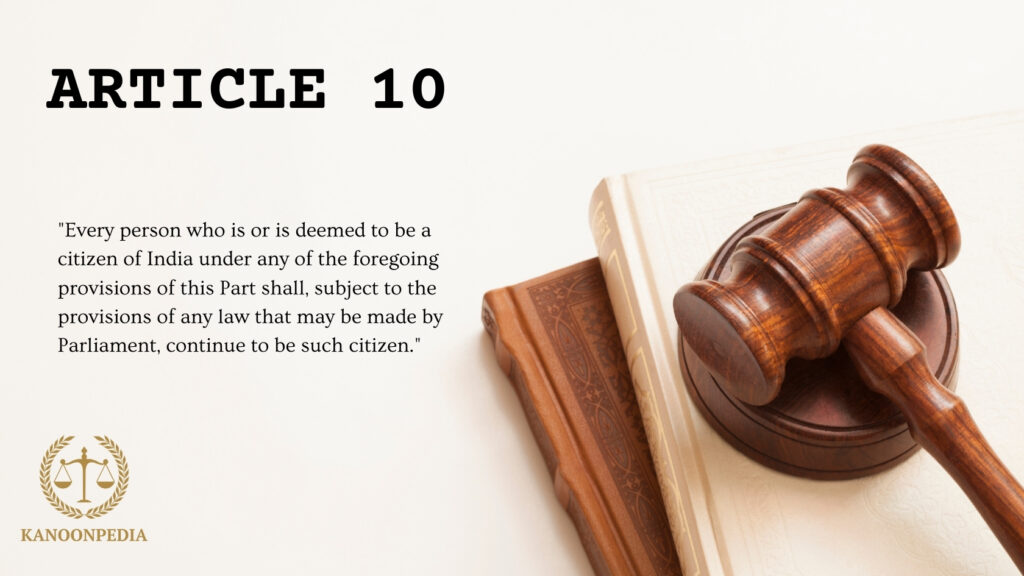Article 10 of Indian Constitution establishes the continuance of citizenship rights for individuals who have been recognized as citizens under the preceding constitutional provisions. Let me provide a comprehensive analysis of this significant constitutional provision.
Table of Contents
Article Bifurcation & Textual Analysis

Article 10 states: “Every person who is or is deemed to be a citizen of India under any of the foregoing provisions of this Part shall, subject to the provisions of any law that may be made by Parliament, continue to be such citizen.”
This provision can be bifurcated into three key components:
- Scope of Application: The phrase “Every person who is or is deemed to be a citizen of India under any of the foregoing provisions of this Part” refers to individuals who qualify for citizenship under Articles 5, 6, 7, 8, and 9. This establishes the comprehensive coverage of Article 10.
- Continuity Principle: The phrase “shall continue to be such citizen” establishes the principle that citizenship, once acquired under the constitutional provisions, continues without interruption. This creates stability and certainty in citizenship status.
- Parliamentary Authority: The phrase “subject to the provisions of any law that may be made by Parliament” recognizes Parliament’s authority to regulate citizenship through legislation, potentially modifying the rights established in the Constitution.

Historical Context & Evolution
Article 10 was not included in the original Draft Constitution of 1948. It was introduced as Draft Article 5C during the Constituent Assembly debates on August 10, 11, and 12, 1949, upon the proposal of the Chairman of the Drafting Committee.
During these debates, there was a motion to delete the article on grounds of redundancy, with the argument that Draft Article 6 (which later became Article 11) was sufficient. However, the Chairman emphasized that the citizenship provisions were temporary in nature and intended to be replaced by a comprehensive citizenship code to be enacted by the future Parliament.
This clarification highlighted the transitional nature of the constitutional citizenship provisions and the need for Article 10 to ensure continuity until Parliament enacted permanent legislation. The Assembly ultimately adopted Article 10 without any amendments on August 12, 1949.
Practical Applications & Contemporary Relevance
Article 10 has significant practical implications for Indian citizens:
- Constitutional Guarantee: It provides a constitutional guarantee that citizenship, once acquired under Articles 5-9, cannot be arbitrarily revoked except through parliamentary legislation.
- Legal Framework: It establishes the foundation for the Citizenship Act of 1955, which provides detailed regulations on the acquisition, termination, and other aspects of citizenship.
- Citizenship Rights: It ensures that citizens can enjoy fundamental rights, participate in democratic processes, access government services, and benefit from welfare schemes.
- Stability and Security: The principle of continuity provides stability and security in citizenship status, protecting individuals from arbitrary changes in their legal status.
Some land mark cases of Article 10
Article 10 of the Indian Constitution ensures the continuance of citizenship for all those recognized as citizens under Articles 5 to 9, subject to any law made by Parliament. While Article 10 itself is procedural and has not been at the center of constitutional litigation as frequently as other articles, it has featured in several important cases that clarify its scope and relationship with subsequent citizenship laws.
Below are some landmark cases and relevant judicial observations involving Article 10:
1. Kedarnath vs. State of West Bengal (1953)
Facts & Issue:
This early post-Constitution case addressed the status of individuals who claimed citizenship rights under the Constitution but whose status was challenged under subsequent legislation.
Judicial Analysis:
The court highlighted that Article 10 guarantees the continuance of citizenship for those recognized under Articles 5 to 9, “subject to the provisions of any law that may be made by Parliament.” The court clarified that Parliament has the authority to regulate, restrict, or even terminate citizenship through legislation, and Article 10 acts as a bridge between the constitutional recognition of citizenship and the power of Parliament to legislate on the matter.
Quotable:
“Article 10 does not confer an absolute or indefeasible right to citizenship; it is always subject to laws made by Parliament.”
2. Section 6A Case (Supreme Court, 2024)
Context:
The constitutionality of Section 6A of the Citizenship Act, which deals with the special status of migrants in Assam, was challenged. One of the questions before the Supreme Court was whether Articles 10 and 11 permitted Parliament to enact such provisions.
Judicial Reasoning:
The Supreme Court held that Article 10, read with Article 11, clearly empowers Parliament to make any law regarding citizenship, including special provisions for certain regions or groups. The Court observed that Article 10 ensures continuity of citizenship but does not limit Parliament’s legislative competence to alter citizenship rights as needed.
Quotable:
“Articles 10 and 11 together reflect the Constitution’s intent to provide continuity, but also flexibility, in citizenship law, allowing Parliament to adapt to evolving circumstances.”
3. Bhagwati Prasad v. Rajeev Gandhi (1986); Madhya Pradesh v. Peer Mohd. & Anr. (1963); Hari Shankar v. Sonia Gandhi (2001)
Relevance:
While these cases primarily interpret Section 9 of the Citizenship Act (termination of citizenship), they reinforce the principle that Parliament’s laws, as envisaged under Article 10, can determine the continuance or cessation of citizenship.
Judicial Position:
The courts have consistently held that citizenship rights recognized by the Constitution are not absolute and can be regulated or terminated by subsequent parliamentary law.
4. General Observations & Constituent Assembly Debates
Significance:
Article 10 was debated in the Constituent Assembly to clarify that citizenship recognized at the commencement of the Constitution would continue, but always subject to Parliament’s authority to legislate on citizenship matters.
Quotable (Dr. B.R. Ambedkar):
“The citizenship provisions are temporary and intended to be replaced by a comprehensive citizenship code enacted by the future Parliament.”

Key Takeaways for Exams and Advocacy
“The Constitution provides the foundation, but Parliament builds the edifice of citizenship law.”
Article 10 is a bridge: It ensures continuity of citizenship at the Constitution’s commencement but subjects it to Parliament’s legislative power.
No indefeasible right: Citizenship under Article 10 is not absolute and can be regulated or terminated by law.
Judicial consensus: Courts have repeatedly upheld Parliament’s competence to legislate on citizenship, even if it affects those recognized under Articles 5-9.
Quotable for exams:
“Article 10 guarantees continuity, not perpetuity, of citizenship; Parliament holds the pen on its future.”
Critical Evaluation of Article 10 of Indian Constitution

Strengths:
- Provides constitutional protection for citizenship rights while allowing for legislative adaptation.
- Ensures continuity in citizenship status during the transition from colonial rule to independent governance.
- Creates a stable foundation for citizenship rights in a diverse and complex society.
Limitations:
- The phrase “subject to the provisions of any law that may be made by Parliament” potentially allows. for significant legislative modifications to citizenship rights.
- Does not explicitly define the limits of parliamentary authority in regulating citizenship.
- May create tension between constitutional guarantees and legislative changes.
Examination & Advocacy Strategy
For UPSC and judiciary examinations, it’s important to understand:
- The relationship between Article 10 and Articles 5-9 and 11
- The balance between constitutional protection and parliamentary authority
- The implementation of Article 10 through the Citizenship Act of 1955
- The principle of continuity in citizenship rights
- The distinction between constitutional provisions and statutory regulations of citizenship.
For legal advocacy, Article 10 can be invoked in arguments concerning:
- Citizenship Rights: Defending the continuity of citizenship rights against arbitrary revocation
- Legislative Challenges: Challenging or defending parliamentary legislation that modifies citizenship rights
- Constitutional Interpretation: Analyzing the scope of parliamentary authority to regulate citizenship
- Historical Claims: Establishing the continuity of citizenship for individuals who acquired citizenship under Articles 5-9.
Article 10 represents a crucial bridge between the constitutional framework for citizenship and the legislative authority to regulate it. By ensuring continuity while acknowledging parliamentary authority, it provides both stability and flexibility in India’s approach to citizenship, reflecting the framers’ vision of a democratic republic that balances constitutional principles with legislative responsiveness.